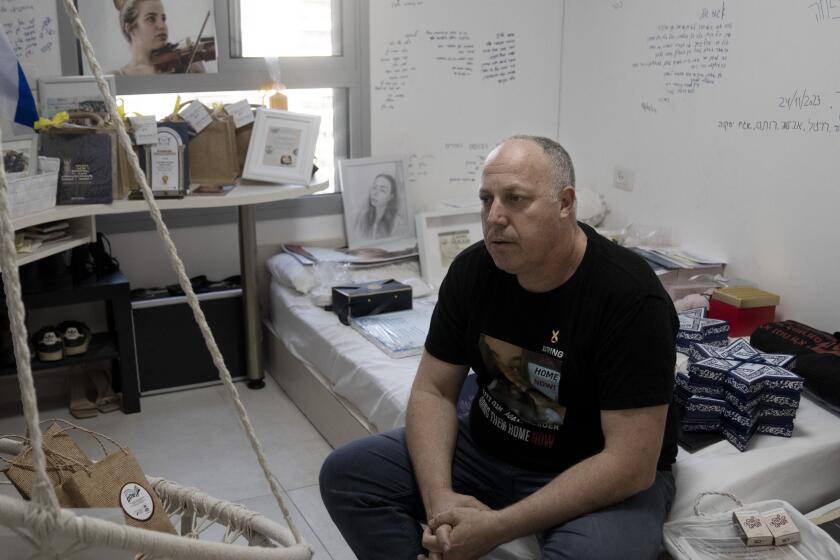Deadly Iraq shootout has bitter irony
Bodyguards of the minister of displacement and migration, who has been telling Iraqis it is safe to come home after five years of war, were involved in a rush-hour shooting Monday that police said killed a woman and injured six other people.
Circumstances surrounding the incident were unclear. The ministry said traffic police fired toward the minister’s convoy and that the bodyguards only fired into the air. Police said the bodyguards were trying to clear traffic by shooting into the air and that one of them accidentally aimed his gun into nearby cars. Witnesses said the shooting was the result of a dispute between the ministry bodyguards and traffic police.
The head of the ministry’s planning directorate, Ali Shaalan, called the incident “totally unacceptable” but said the ministry guards had done nothing wrong.
Whatever the real story, the incident placed the minister, Abdul-Samad Rahman Sultan, in an awkward position.
For months, he has been urging Iraqis who fled the country during the war to return home, saying it is safe. Violence has greatly eased, but random shootings are examples of the tenuous state of security and of the risks Iraqis face each day.
Police said a woman who was a passenger in a minibus taxi was killed in the shooting.
Shaalan said he and Sultan had just arrived back in Iraq from Ukraine, where they had met with Iraqi refugees. They were waiting at the airport for the convoy, which was still en route in western Baghdad when the shooting occurred.
“The traffic police were the first to open fire toward our convoy . . . and I want to make that clear,” he said. “The bodyguards of the ministry’s convoy only fired upward into the sky.”
He called the incident a misunderstanding arising from confusion in the traffic tie-up. “As you know, things can never be perfect and accidents happen everywhere,” Shaalan said.
A man who gave his name as Waleed and said he had been in the minivan taxi, said the bodyguards in the ministry convoy fired into the air to clear traffic, drawing the attention of the traffic police, who fired on them. Waleed said he jumped out of the taxi and hid between cars.
“I was afraid that I could be shot,” he said. “When the shooting stopped, I ran away from the scene.”
Another witness, who wanted to be identified only as Ali, had a slightly different version. He said he thought the convoy hit a traffic policeman while trying to push through a traffic jam. An argument broke out between the traffic police and the bodyguards, and both sides drew guns.
“They started to shoot at each other. The convoy tried to leave and the shooting erupted between the traffic police and the convoy,” said Ali, who was standing beside his taxi in front of a nearby railway station.
A police official said the ministry reported that the convoy was fired on by unknown attackers. But police, who did not want to be identified because they were not authorized to speak to the media, said they believed the convoy was not fired on and that bodyguards began shooting to disperse vehicles blocking it. This is a tactic often used by bodyguards of foreign and Iraqi VIPs, and it is blamed for killing and injuring innocent civilians.
Police said several guards had been detained and that an investigation was underway. Shaalan said the guards had surrendered and that their detention proved “no one is above the law.”
An estimated 2.5 million Iraqis have fled the country since the U.S.-led invasion in March 2003. Last month, in an effort to lure them back, the government began offering free flights from neighboring countries harboring the majority of Iraqi refugees.
The International Organization for Migration says that about 16,000 people have returned from abroad since the government launched a campaign late last year to encourage people to come back.
South of Baghdad in Babil province, meanwhile, health officials declared a state of emergency as contaminated water continued to spread disease, including cholera. Some provincial council members accused the Iraqi government of wanting to cover up the problem, which they say is the result of failed infrastructure and water purification projects not working properly.
The council chairman, Mohammed Massoudi, declared a state of emergency and said there had been 13 cholera cases alone in Hashimiya, a city 18 miles southeast of Hillah.
--
Times staff writer Usama Redha in Baghdad and special correspondents in Baghdad and Hillah contributed to this report.
More to Read
Start your day right
Sign up for Essential California for news, features and recommendations from the L.A. Times and beyond in your inbox six days a week.
You may occasionally receive promotional content from the Los Angeles Times.






